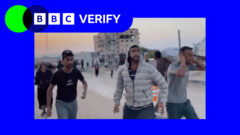In a significant diplomatic maneuver, the United States vetoed a U.N. Security Council resolution calling for an immediate cease-fire in Gaza, underscoring its unwavering support for Israel amid growing international concern.
U.S. Blocks U.N. Resolution for Cease-Fire in Gaza Amid Global Outcry

U.S. Blocks U.N. Resolution for Cease-Fire in Gaza Amid Global Outcry
The U.N. Security Council faces division as the U.S. vetoes a resolution aimed at halting violence in Gaza.
The U.S. government utilized its veto power on Wednesday to reject a resolution that urged an unconditional cease-fire and the release of hostages while also advocating for the restoration of humanitarian aid to Gaza. The resolution was brought forth for a vote by ten nonpermanent members of the 15-seat Council, marking a notable moment within the context of the ongoing Israel-Hamas conflict since the onset of hostilities on October 7, 2023.
This veto, the first by President Trump's administration in relation to the cease-fire proposals, showcased the U.S.'s global isolation in its foreign policy stance on the ongoing crisis. While 14 other members of the Council, including notable powers like Russia and China, voted in favor of the resolution, the U.S. stood alone. The dissent highlighted Washington's continued commitment to Israel's defensive rights, despite criticism of the humanitarian impact of its policies.
"All Council members' consensus indicates that hostilities in Gaza need to cease, hostages should be released, and aid access must be prioritized," emphasized Slovenia’s ambassador to the U.N., Samuel Zbogar, while presenting a statement from the supporting members before the vote.
To pass a resolution, it typically requires nine votes in favor without any vetoes from the five permanent members—United States, Russia, China, Britain, and France. The U.S. has previously vetoed four calls for cease-fires during this escalation of violence. Dorothy Camille Shea, the interim U.S. envoy to the U.N., reiterated America's stance, asserting that the path to peace relies on Hamas' surrender, juxtaposed with a claim of Israel's inherent right to defend itself from attacks.
This veto, the first by President Trump's administration in relation to the cease-fire proposals, showcased the U.S.'s global isolation in its foreign policy stance on the ongoing crisis. While 14 other members of the Council, including notable powers like Russia and China, voted in favor of the resolution, the U.S. stood alone. The dissent highlighted Washington's continued commitment to Israel's defensive rights, despite criticism of the humanitarian impact of its policies.
"All Council members' consensus indicates that hostilities in Gaza need to cease, hostages should be released, and aid access must be prioritized," emphasized Slovenia’s ambassador to the U.N., Samuel Zbogar, while presenting a statement from the supporting members before the vote.
To pass a resolution, it typically requires nine votes in favor without any vetoes from the five permanent members—United States, Russia, China, Britain, and France. The U.S. has previously vetoed four calls for cease-fires during this escalation of violence. Dorothy Camille Shea, the interim U.S. envoy to the U.N., reiterated America's stance, asserting that the path to peace relies on Hamas' surrender, juxtaposed with a claim of Israel's inherent right to defend itself from attacks.






















